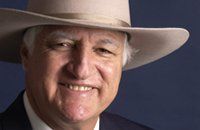KAP backs bank deal but demands long-term solution for regions
February 13, 2025
FEDERAL Member for Kennedy, Bob Katter, has commended the government's deal with the major banks to ensure regional bank branches remain open, but has called for a long-term solution.
"I've got to pay credit to the government here," Mr Katter said. "They've moved against going cashless and they've moved against the closure of regional banks.
"Though there's probably been more closures in the outer suburbs than the towns and regions. People think this is an issue for the bush, but the outer suburbs have done worse off than us.
"So yes, we have to praise the government for this initiative. As well as all those who rose up in righteous anger over the closures – just as they did for the cashless proposals.
"But, while this provides temporary relief, it is not enough. We can't keep kicking the can down the road. We need bold action to secure regional banking services for the future."
The Katter's Australian Party (KAP) has long advocated for banking services in regional Australia, where communities face significant barriers to accessing essential services.
In 2023, the KAP's state and federal MPs successfully pressured one of the big four to reverse regional branch closures.
Mr Katter has a long history with the banks, being one of two ministers responsible for the success of the State Bank of Queensland (SBQ) and the Queensland Industry Development Corporation (QIDC).
"In Australia, we have this thing called recourse lending. If you go broke, not only have you lost your house and the money you put into it, but for the rest of your life, you will carry that debt on your back, and the banks will hound you until the day you die. But, if it's a peoples' bank, then I am confident that would not occur."
The Member for Kennedy has previously called for establishing a true government-owned or postal bank, which would be a reliable option for Australians in regional and remote areas.
"This is not just about preventing closures; it's about creating a system that works for everyone, no matter where they live. There are solutions; we just need the political will to make them happen.
"Now, we've got to ask ourselves, why are the banks scared of a peoples' owned bank?"
KAP Leader and Traeger MP Robbie Katter welcomed the government's intervention but cautioned it's only one part of the solution.
"The Federal Government's assurance the banks will be forced to maintain their bricks and mortar presence in rural and remote communities is welcome, but it's only one piece of the puzzle. What's the use of a bank branch being open in Cloncurry or Normanton if, when people walk in there to get a loan for a home or a business, they have the city-centric bank's lending appetite stacked against them?" Mr Katter said.
"By their very nature, private banks lend only on the basis that the risk they absorb will pay off in profits to their shareholders; they have no other motivation or obligation.
"A public bank - which we know can be physically facilitated through the Australia Post network that already functions partly as a bank, though not a lender, through its Bank@Post services - would be able to prioritise the Australian people who live in the non-urban places that the private banks pass over time and time again."
ENDS

FEDERAL Member for Kennedy Bob Katter has come out swinging after Queensland's Weapons Licensing bureaucrats effectively shut down long-standing ANZAC Day commemorations by historical re-enactment groups, calling it "soulless, tone-deaf bureaucracy at its absolute worst." Mr Katter was alerted by Robert Finlay—a member of the Australian Living History Federation—that living history groups were being blocked from participating in ANZAC Day and other commemorative events due to shifting interpretations of licensing conditions. "These are not wild gun fanatics or some fringe mob," Mr Katter said. "These are our ex-servicemen, history enthusiasts, and community volunteers—many of them older veterans—who respectfully reenact military scenes to bring our past to life and honour our fallen. "And now, some bureaucrat sitting in a Brisbane office has decided they know better than the Minister, better than our RSLs, and better than common sense—and has told them to stop." The Australian Living History Federation and its member groups have followed the same licensing conditions since 2017, under exemptions MR4 and MR5 of Queensland's weapons licensing framework. These conditions set out the responsibilities for safe, respectful use of blank-fire and replica weapons during public displays. "Let me be very clear," Mr Katter continued, "there's been no change to the Weapons Act. There's no new regulation. No incident. Just an overzealous department deciding ANZAC Day needs to be micromanaged and possibly cancelled, unless these groups jump through a whole new set of invisible hoops." Emails from Mr Finlay show that despite providing all required notices and documentation—including safety guidelines and public liability insurance—the group was told they must now seek full approval for events they are merely participating in, not organising. Even attempts to clarify the matter with the Queensland Police Minister's office were brushed aside by Weapons Licensing, who appear unwilling to budge. "This is bureaucracy gone rogue. And what's worse—it's at the expense of ANZAC Day," Mr Katter said. "We've got crime exploding in regional Queensland and they're worried about a bloke in a slouch hat firing blanks in a tribute parade." "I'll be taking this to Canberra if it isn't resolved. These people are doing this out of respect, out of patriotism, and out of deep love for this country's history. And it's time our public servants showed a bit of the same." ENDS
FEDERAL Member for Kennedy Bob Katter has taken aim at supermarket giants Coles and Woolworths for refusing to display a simple nativity scene at Easter, calling it a disgraceful rejection of the very foundation of the holiday. Mr Katter released a video over the weekend slamming the corporate chains after they declined to display a small pop-out featuring Jesus, Mary, and Joseph in a stable—an item offered to all supermarkets in Cairns. “All the independents were more than happy to put it up,” Mr Katter said. “But Coles and Woolies? They turned their noses up at it.” The outspoken MP said he was “furious” and reminded viewers that Easter is about much more than chocolate eggs and retail profits. “Two thousand years ago, a baby was born in a shed out the back of a pub. This kid grew up and became pretty famous. He travelled around saying you should love your neighbour and make the world a better place.” “Well, let me remind you what happened to the money changers in the temple. They burnt in hell. And there's a message there for the likes of Woolworths and Coles.” Mr Katter accused the major supermarkets of profiting off Easter and Christmas while refusing to acknowledge their true meaning. “They make squillions off this time of year, flogging chocolate bunnies and hot cross buns months in advance—but when it comes to honouring what it’s all about, they disappear.” This latest outburst follows Mr Katter’s ongoing campaign against the supermarket duopoly, including a protest with farmers and fellow MP Andrew Gee outside a Woolworths in Bathurst last week. The protest focused on skyrocketing grocery prices and the pressure being placed on Australian producers. In March 2024, Mr Katter also introduced a private members bill to Parliament that seeks to reduce the market power of Coles and Woolworths by 20 per cent over five years and establish a new commissioner for food retailing. “The fight’s far from over,” he said. “Whether it’s price gouging, crushing our farmers, or scrubbing out our Christian values—I’ll keep calling them out.” ENDS
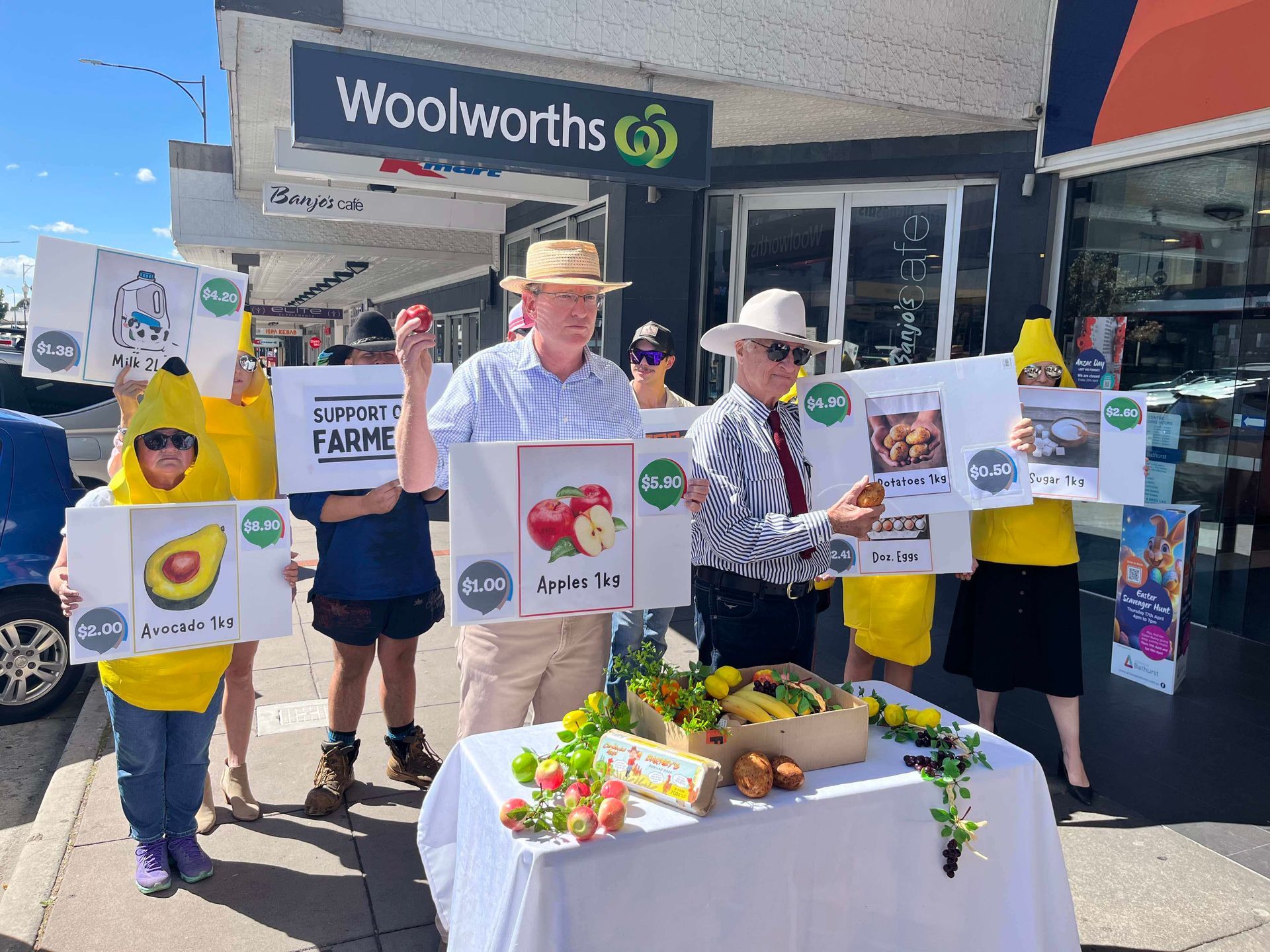
KAP Federal Member Bob Katter and Independent Member for Calare, Andrew Gee have been flanked by farmers out the front of a Woolworths in Bathurst in New South Wales to continue to crusade against the supermarket duopoly and to blow the whistle on the monstrous, unjustified markups of everyday fruit and vegetables. "The ACCC said in their February 2025 report there was no evidence of price gouging despite the fact that they are among the most profitable supermarkets in the world. Well, if you believe that, you believe in the tooth fairy and we will be moving for the head of the ACCC to be sacked when Parliament resumes," Mr Katter said. He said the rage he felt after reading the report left him with no other option but to prove farm gate prices in another part of the country were as bad as in north Queensland. "It is clear we set the agenda last year when we started the parliamentary year with an enormously powerful pig suit "snouts in the trough" stunt. On that same day, Woolworths reduced the price of over 400 items of food, and we introduced the Reducing Supermarket Dominance Bill. Then, every other party announced they would be moving for divestiture." Mr Katter said that the farm price "stunt" in Bathurst drew the attention needed to ensure that Australian voters understood the two major "big boys" in the Parliament will look after the interests of the two "big boys" outside the Parliament, and that only independent MPs would be able to pressure the government into action. "The spotlight has been put fairly and squarely on the supermarket giants and what happens to parasites under the bright heat of a spotlight? They perish," Mr Katter said. Hon Andrew Gee said, "We need to get the snouts of the supermarket giants out of the money trough. "They are wallowing in world-leading profits while paying our farmers a pittance and price gouging consumers on the way through. It's shocking behaviour in a cost-of-living crisis. "Our Bill would give farmers a better deal at the farm gate and consumers a better deal at the checkout. "It would even the playing field between farmers and consumers on the one hand, and the supermarket giants on the other. "Coles and Woolies are amongst the most profitable supermarkets in the world. They have an 80 per cent market share and prices have risen 24 per cent in the last five years. These profits have been made at a huge cost to our farmers and their own customers. It's disgraceful. "Farmers are leaving the land because they can't make a decent return, and consumers are at breaking point. "Our Bill is a gamechanger that will finally bring these price gougers to account," Mr Gee said. Mr Katter said he had been contacted by farmers and consumers from all over the country who had asked him to continue to fight on their behalf after being squeezed for years by the greedy supermarket giants and their market power. "A number of our farmers pay themselves some of the lowest wages in Australia. Recent calculations are that most farmers are paying themselves less than $2 an hour," he said. "The return that an Australian farmer can get for their produce is generally split with 50 per cent going to wages, a further 49 per cent covering transport, fertiliser, packaging and farm maintenance, leaving only 1 per cent for the farming family. "I mean, are we just going to let them continue screwing the farmers down through the floor and charging the consumers a 'squillion' dollars? No bloody way." The Reducing Supermarket Dominance Bill introduced to Parliament in March 2024: Forces divestiture of the supermarkets and their market power in the grocery sector to a maximum of 20 per cent within five years. Provides for 100 per cent markup on the price paid to producers, to what is charged to consumers. Scraps the 'food and grocery code of conduct', noting it fails to address power imbalances and instead provides a mechanism by which supermarkets control suppliers and producers. FARM GATE VERSUS SUPERMARKET PRICES

Independent Federal Member for Calare, Andrew Gee, and Independent Member for Kennedy, Bob Katter, have announced a major new push to protect Australia’s most productive farmland, warning that without urgent action, vital agricultural land will continue to be lost to development and changing land use. If re-elected, the pair will introduce legislation, titled the Protecting Australia’s Prime Agricultural Land Bill, to safeguard Australia’s prime agricultural land, ensuring it remains dedicated to producing food and fibre for Australia and the world. Mr Gee said the need for action was clear, with urban expansion, explosion of lifestyle blocks, infrastructure and large-scale industrial projects rapidly consuming prime-quality farmland. “Food security is a key part of our national security. As the population of the world increases, food security is going to be a critical global issue and may even be a source of future conflict. It’s fundamental to the ongoing success and prosperity of our nation,” Mr Gee said. “Once prime agricultural land is gone, we can’t get it back. It’s a strategic national resource. You can’t grow food once the land is covered in concrete.” For the Central West, Mr Gee said the legislation would help secure the region’s agricultural and economic future. “This is about protecting the land that’s sustained our communities for generations,” he said. “This Bill backs our farmers, protects local jobs, and keeps the Central West one of Australia’s most vital food-producing regions.” Mr Katter said “The French and the European Union have said, ‘if we remove the farmers, we have no one to look after the land’. “Without farmers, the land turns into fire starters, feral pig pens and weed nurseries. “Farms are carbon absorbers. Take sugar cane for example, in a 12-month period a vacant field becomes solid CO2 absorbing biomass. A hectare of sugar absorbs 50 tonne of CO2. “If we lock agriculture out of our best grazing and food producing country then we will turn this nature wonderland into urban streets and industrial developments. “This bill gives the farmer the power to say, “bugger off.” The Protecting Australia’s Prime Agricultural Land Bill will ensure that prime agricultural land is preserved for agriculture while giving farmers agency and control over their land. The centrepiece of the policy will be farmers deciding how their land is used, not governments or anyone else. It would mean that people buying rural properties containing prime agricultural land would have to use that land for agriculture. It will take a strategic and nationally coordinated approach to supporting farmers’ rights to use and manage their land productively and ensure land use decisions do not undermine Australia’s future agricultural capacity and security. ENDS
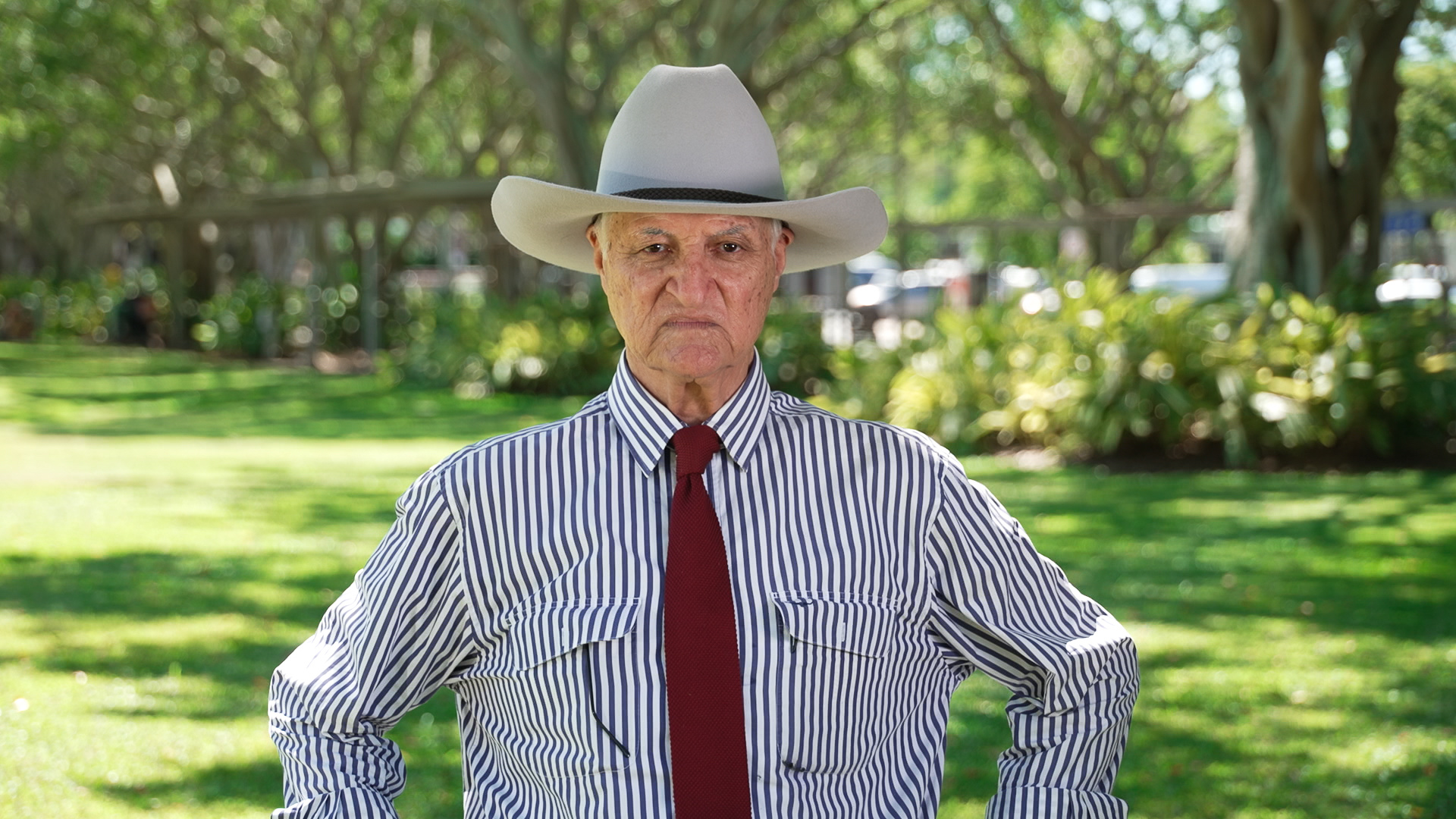
Katter’s Australian Party MP Bob Katter has been out walking the streets and asking locals one simple question: “If you were the boss of Australia, what are the top three things you'd do?” “And I’ve got to say – I’ve loved the answers. Real, honest, common-sense ideas. One of the most popular? Cheaper fuel. And they’re dead right,” Mr Katter said. “Cheaper fuel isn’t hard. It’s not rocket science. In fact, there’s no country on earth better set up for ethanol than Australia. We’re one of the biggest sugar and grain producers on the planet. But instead of turning that into affordable, clean fuel – we hand our money over to foreign-owned oil corporations.” “What sort of country buys all its petrol from overseas when it has the resources sitting in its own backyard?” he asked. “We buy our fuel and even our solar panels from overseas – solar panels that are made in coal-powered factories in China, by the way – while we could be producing both our fuel and electricity here for half the price. Using our own workers, our own contractors, and supporting our own farmers.” “If people keep voting for the major parties, this madness will continue. You’ll keep paying through the nose while the profits keep flowing offshore.” ENDS
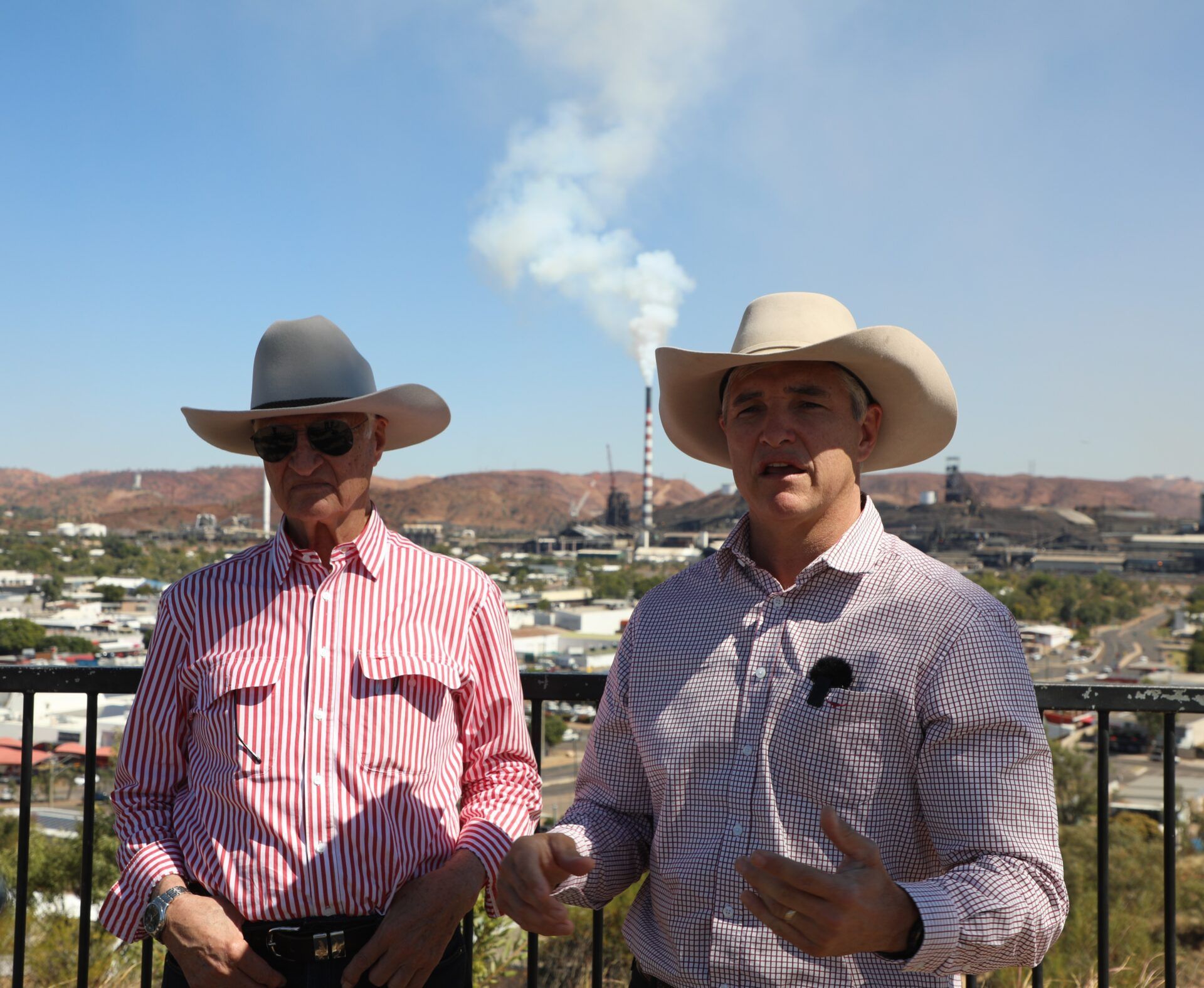
“This place needs to be allowed to play its role as the industry powerhouse for the state and national economy,” the Katter’s Australian Party (KAP) Leader and Member for Traeger, Robbie Katter has said while in Mount Isa today. Flanked by the Federal Member for Kennedy, Bob Katter, Mr Katter doubled down on calls for all levels of government to prevent Glencore from sitting on Australian critical minerals. “The Prime Minister has said that the centre point of tariff negotiations with Trump are critical minerals,” he said. “Well, the North West Minerals Province is Australia's trump card. “It shows how out of touch Canberra and Brisbane are when you have on the same day, the Prime Minister touting our critical minerals and you have Glencore announcing they’re closing Mount Isa Mine and threatening to close the smelter – all due to energy prices. “You simply can’t have a critical minerals future in Australia without CopperString and a functioning copper mine and smelter at Mount Isa. “Australia’s sovereignty and international bargaining chip is being held to ransom by a Swiss-based global commodities trader, the Prime Minister must act urgently to defend what is rightly ours,” Mr Katter said. The Member for Traeger called for new thinking in how to keep a copper smelter serving the whole region. “We don’t want saving, we want reform. “We want arrangements such as an equity share or a new common user smelter, not cash handouts to Glencore. We need a special economic zone out here, and CopperString completed. “We need confidence for the whole region and Australia’s critical mineral future that there will be industrial capacity – not left to be pending an arbitrary decision from the profit hungry Glencore’s boardroom. “It’s immature of all governments to allow our nation’s sovereignty to be at stake,” the Member for Traeger said.

KAP Federal Member for Kennedy Bob Katter, joined by Hill MP Shane Knuth, Tablelands Mayor Rod Marti, and Tablelands Cycle Sports President David Prete, has called on state and federal governments to commit funding for crucial pre-works assessments on stage two of the Atherton Forest Mountain Bike Park (AFMBP). Mr Katter emphasised the park's expansion would be vital for the economic prosperity of the Tablelands region and the broader Far North. "This is a region that pumps out sugarcane, avocados, bananas, coffee and more for the rest of the country – really, it's the food bowl of the north – and what do we ask in return? Just a small investment in infrastructure that brings people here, keeps locals active, and gives people something to do besides staring at a screen." Stage one of the AFMBP, delivered in 2013, was a collaborative effort involving Tablelands Cycle Sports (TCS), Tablelands Regional Council (TRC), Queensland Parks and Wildlife Service, and First Australians representatives. The trail network now spans approximately 55 kilometres of purpose-built mountain bike trails designed and constructed by World Trail . Stage two aims to add over 50 kilometres of internationally benchmarked trails, positioning the AFMBP on the national and global map for mountain biking destinations. "These trails will be inclusive, world-class, and profitable," Mr Katter said. "They'll get kids off the couch, tourists out of the airport, and dollars flowing into the Far North." The existing trails meet almost all the criteria required for international trail recognition under World Trail benchmarking, including airport proximity, accommodation, and a natural landscape. The primary enhancement needed is increased trail density, which this expansion seeks to address. "David and the team at Tablelands Cycle Sports have done the hard yards for over a decade. And I really must acknowledge the work they've done to get this project to where it is today. They've maintained the trails, raised the flag, and pushed all three levels of government to take this seriously," Mr Katter said. "This isn't just about Atherton – better trails here mean a better chance for other northern towns like Cardwell and Mission Beach to increase the quality and quantity of their trails and capitalise on the momentum we are seeing elsewhere." KAP State Member for Hill, Shane Knuth, expressed his longstanding support for the AFMBP and urged all levels of government to collaborate on funding stage two. "I met with the Minister for Tourism recently and outlined how important this project is," he said. "Mountain biking is a rapidly growing sport and so is the adventure tourism market worldwide. "We have already seen Derby in Tasmania take advantage of this through significant government investment, which has paid off with an incredible increase in visitation numbers. "The Atherton Tablelands is perfectly placed to take a big chunk of this market and become a world-class destination not only for tourism but as a training base for international competitors for the 2032 Olympics. David Prete, founding President of Tablelands Cycle Sports, highlighted the potential of mountain biking for the region. "Tasmania got in early – they saw the opportunity[ 1 ]. Derby now attracts 60,000 plus visitors a year, and Whistler in Canada makes more money in the biking season than the ski season," Mr Prete explained. "Mountain bikers are high-value visitors – they stay longer, they spend more, and they come back[ 2 ]. This is a game-changer for Far North Queensland." A completed business case indicates the project would return $4 for every dollar invested and generate nearly $70 million for the regional economy over the next decade. "All we're asking for is funding to do the groundwork," Mr Katter said. "Stage one was a joint effort between Council, State, and Federal Governments – and it'll take the same kind of commitment again to make stage two a reality. "This is a golden opportunity to secure the Far North's future. So Canberra – saddle up and back it in." ENDS [1] www.theaustralian.com.au/travel/how-mountain-biking-helped-tasmanias-derby-blaze-a-prosperous-new-trail/news-story/62bf8806cfc19484c6528357d173009e [2] www.tourismtasmania.com.au/siteassets/documents/ttas-ua-mtb-enthusiast-profile.pdf

FEDERAL Member for Kennedy Bob Katter has welcomed key elements of the opposition's budget reply speech, particularly the commitment to a reserve resource policy (RRP)—a policy Katter has championed for over 15 years. The policy works to ensure a percentage of Australia's natural resources, in this case, gas, are reserved for domestic use before being exported. It is designed to safeguard Australia's energy security, lower domestic prices, and prioritise Australian industry. While acknowledging the opposition's move towards protecting the nation's natural wealth, Mr Katter also praised the Albanese government's commitment to regional infrastructure. "We praise the prime minister for committing to the great inland highway, and we thank the opposition leader for the RRP, which we've been screaming for—for more than 20 years," Mr Katter said. "We ask questions in parliament, and these questions stay in their memory bank," Mr Katter said. "The opportunity has arisen for him [Dutton] to act upon those questions. "I hope it is more than me preaching for RRP, but I'm not sure if I've ever heard anyone else preaching for it," Mr Katter remarked. For nearly two decades, Mr Katter has been a sustained and lone voice in the parliament pushing for a reserve resource policy after being part of the inner-power group in the Queensland Bjelke-Petersen government, which implemented a similar policy and saw Queensland's development proposer and household electricity bills remain stable. "Queensland's (former) reserve resource policy meant most of the state's electricity was coming from the world's biggest power stations and had zero input costs – the coal was free, taken by law, by the government under the RRP," Mr Katter explained. With Australia paying up to $16 a unit for its gas, while countries like the United States paid about $6 a unit, Mr Katter said the nation "could not compete" in manufacturing – a key influence in rising cost-of-living pressures. "Gas prices threaten the entire existence of industry in Australia. With the grim outlook for coal and all mineral processing – Australia is looking down the barrel of 200,000 jobs vanishing and, within three years, a plateau of the iron ore industry. "The outlook is as barren as the middle of the Simpson Desert. "And until now, governments (past and present) would rather export our resources, sell off our assets and let foreign companies prosper, rather than implement a reserve resource policy and retain our assets; which would reduce the ever increasing costs of living," said Mr Katter. "But let's see if the LNP are serious about this or not, or if it is just another 'polly promise' on election eve." ENDS
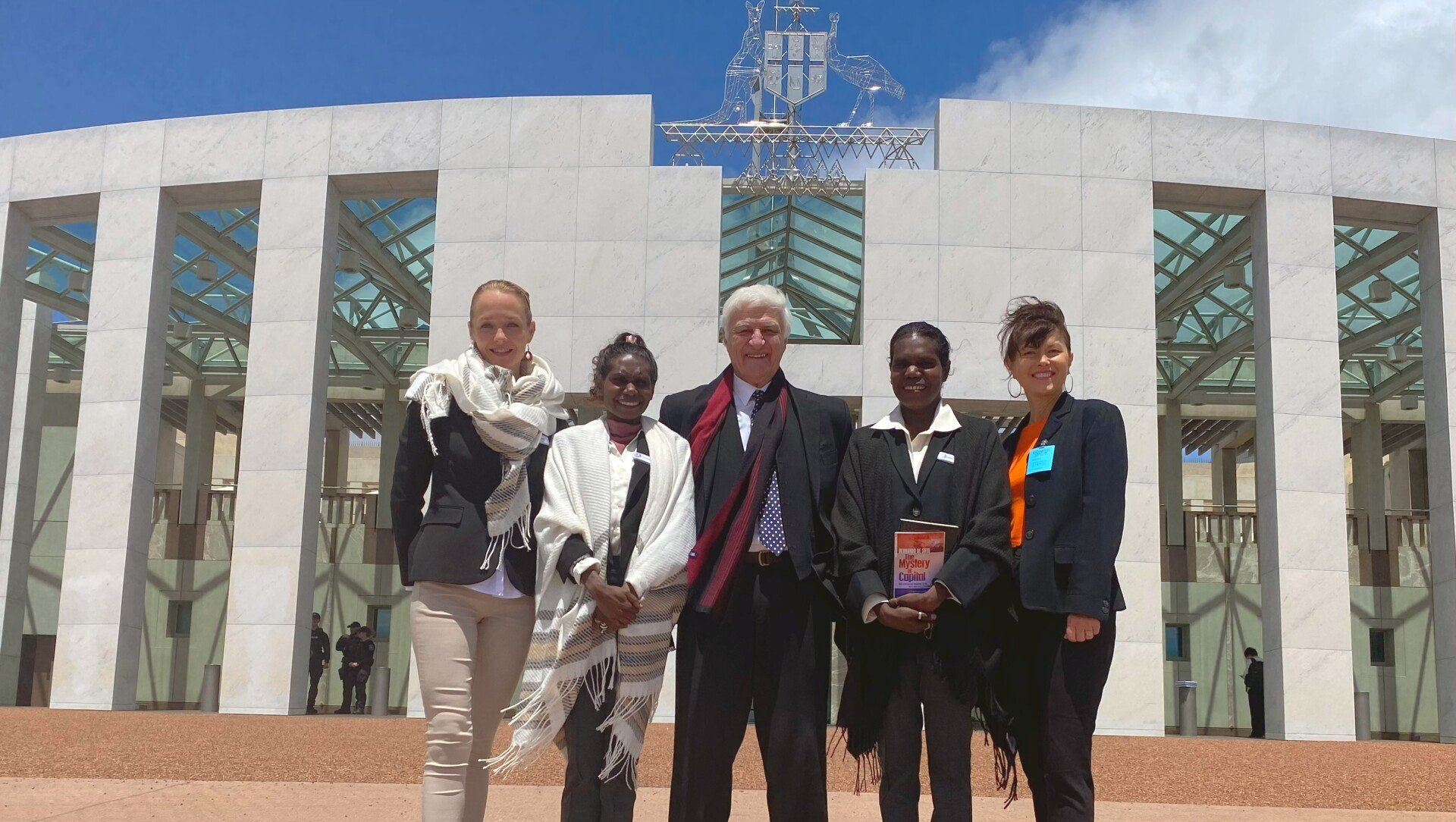
FEDERAL Member for Kennedy Bob Katter has praised the efforts of government services and community groups in reducing the rates of rheumatic heart disease (RHD) and rheumatic fever by half in the First Australian populations of Mornington Island, Doomadgee and Mount Isa. “While this is a fantastic outcome moving towards closing the gap, we need to do more; we need to get back to the basics with people having access to fresh fruit and vegetables,” he said. “When I was minister for Aboriginal affairs in the Queensland Government, communities had market gardens so every family could access fruit and vegetables without paying premium prices for freighting it from down south. “People in the community were taught and paid to manage these market gardens and the whole community benefited,” Mr Katter said. First Nations Health executive director Christine Mann said a partnership with Orange Sky to provide access to clean linen and clothing has reduced the incidence of scabies, sores and infected skin conditions and North West HHS have recorded a decrease in RHD in First Australian communities. The project also includes training health workers, clinicians and community members in the risks and signs of RHD. Ms Mann is also proud of fostering a culturally inclusive and safe health service. “We are fortunate to have dedicated First Nations staff that exceeds the national target by three times, with First Nations people currently representing 10 percent of our workforce who work tirelessly to shape solutions to provide services that work towards closing the gap. “Having a strong and well-represented First Nations workforce, that is complemented by skilled and passionate clinicians and health service support staff, is a solid way we can enhance the accessibility of the health service, ensure culturally safe health care and improve patient experience for First Nations,” Ms Mann said. ENDS
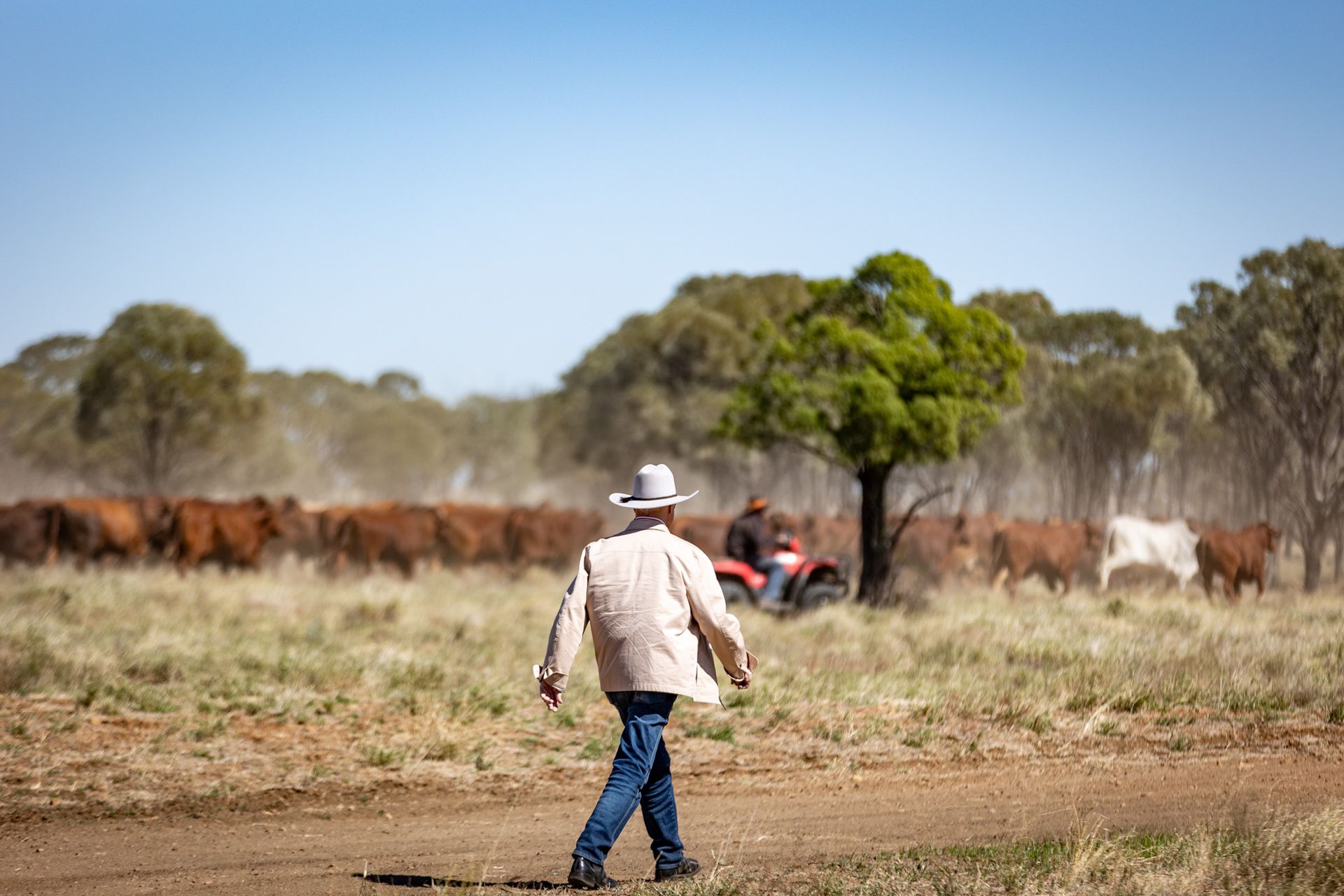
FEDERAL Member for Kennedy Bob Katter has voiced strong opposition to the proposed listing of buffel grass (Cenchrus ciliaris) as a Weed of National Significance (WoNS), highlighting its vital role in Australia's beef industry, urging the government to abandon the proposed listing. "Buffel grass wasn't brought here by accident – it was introduced because it's one of the best options we've got. It holds the soil together and keeps the cattle fed even during drought," Mr Katter explained. "The Gulf and Peninsula were built on buffel, Brahman, and bitumen." A WoNS listing could impose legislative restrictions, mandate removal efforts, and initiate biological control research aimed at eradication. Such measures threaten one of Australia's most vital pasture species, which underpins the livelihoods of countless Aussie farmers and sustains production of beef that is essential for domestic and international food security. "Buffel grass is essential to the northern cattle industry, and to label it as a weed would be counter-intuitive, turning all of the North into a weed-infested dust bowl," Mr Katter emphasised. Talk to any northern cattle farmer and they will tell you it is not just good cattle fed, buffel grass protects soil, cools the ground, sequesters carbon, and supports native fauna. Its deep-rooted resilience has dramatically improved rainwater efficiency and environmental sustainability across Australia. "Buffel grass is not some noxious weed—it's an improved pasture grass. It holds the soil together, soaks up the rain, and has improved sustainability while reducing erosion," Katter said. "Meanwhile, terrible invasive species like lantana, prickly acacia, rubber vine, and feral cats and pigs, should be demanding our attention. Why on earth are we wasting our time even talking about this?" Mr Katter criticised the narrative surrounding buffel grass as being rooted in anti-livestock ideology rather than genuine environmental concern. "Rural and regional Australia will not survive without an effective, improved pasture—buffel is the best pasture grass we've got, and anyone saying otherwise needs their head read," Katter declared. KAP Leader and Member for Traeger Robbie Katter said the federal government's consideration of adding buffel grass to the WoNS registry, a move driven by ideologically-motivated environmentalists, was extremely misguided. "These people are fools - they can't be bothered to take consequential action on the myriad of extremely serious weeds and pests that are destroying Australia's native ecosystem, and yet they want to pursue this," he said. "The fact remains that we have to feed our nation and, buffel grass, for what limited environmental risk it poses, is one of our best performing pastures and one that underpins the entire northern beef industry. "The need to be able to deliver on our food production demands leaves for dead any perceived environmental risks buffel grass poses. "Sometimes you have got to wonder if these 'green' groups, whose bidding the government is doing here, won't stop until our entire agricultural industry is dead and we import everything into this country." AgForce Queensland Cattle President Lloyd Hick said, "This is not an isolated issue. It is part of a broader pattern of decisions being made without industry input, with disastrous consequences for agriculture and Australia. If the beef sector does not push back hard on this, it will be taken as a win and another critical pillar targeted next. "Producers are increasingly frustrated as time and energy that should go into food production is spent pushing back against agenda-driven ideas and re-educating city-based decision makers who think they understand the land—but don't." ENDS
